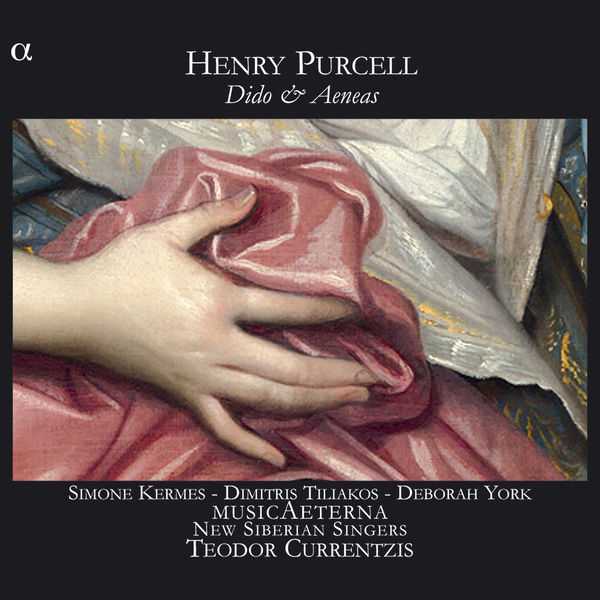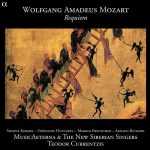

Composer: Henry Purcell
Performer: Simone Kermes, Dimitris Tiliakos, Deborah York, New Siberian Singers
Orchestra: musicAeterna
Conductor: Teodor Currentzis
Format: FLAC (tracks)
Label: Alpha
Release: 2008
Size: 308 MB
Recovery: +3%
Scan: cover
Dido & Aeneas, Z.626
01. Ouverture
Act I
02. I. Shake the Cloud
03. II. Ah! Belinda
04. III. Grief Increases
05. IV. Chorus “When Monarch Unites”
06. V. Whence Could so Much Virtue Spring
07. VI. Chorus “Fear No Danger”
08. VII. See, See
09. VIII. Chorus “Cupid Only Throws”
10. IX. If Not for Mine
11. X. Pursue Thy Conquest
12. XI. Chorus “To the Hills”
Act II
13. I. Prelude for the Witches
14. II. Chorus “Harm’s Our Delight”
15. III. The Queen of Carthage
16. IV. No. 1, “Ho, ho, ho”
17. V. Ruin’d Ere the Set of Sun
18. VI. No. 2, “Ho, ho, ho”
19. VII. But Ere We This Perform
20. VIII. Chorus “In Our Deep Vaulted Cell”
21. IX. Echo Dance of Furies
22. X. Ritornelle
23. XI. Thanks to These Lonesome Vales
24. XII. Guitar Chacone
25. XIII. Oft She Visits
26. XIV. Behold, Upon My Bending Spear
27. XV. Haste, Haste to Town
28. XVI. Stay, Prince
Act III
29. I. Prelude
30. II. The Sailor’s Dance
31. III. See, See the Flags
32. IV. Our Next Motion
33. V. Chorus “Detruction’s Our Delight”
34. VI. The Witches’ Dance
35. VII. Your Counsel
36. VIII. Chorus “Great Minds”
37. IX. Thy hand, Belinda
38. X. Dido’s Lament
39. XI. Chorus “With Drooping Wings”
It’s difficult to know where to begin enumerating the qualities that make this astonishing performance of Dido and Aeneas unique. The most obvious is geographical: the recording was made at the Opera Theatre of Novosibirsk, Siberia. The chorus is the New Siberian Singers and the early music ensemble Musica Aeterna, is based in Novosibirsk, and most of the secondary parts are taken by Russian singers. Otherwise, the cast is international; Simone Kermes (Dido) is German, Deborah York (Belinda) is British, and Dimitris Tiliakos (Aeneas) and conductor Teodor Currentzis are Greek, although Currentzis has been based in Russia since 1994 and has been at the Novosibirsk Opera since 2004. The performance itself challenges much of the conventional wisdom about the opera; it is so daringly idiosyncratic that if it didn’t work brilliantly, it might be dismissed as an eccentric exercise in interpretive hubris.
To begin with, the performance practice sounds more Continental than English in its execution of dotted rhythms, instrumentation, style of ornamentation, and extreme tempo choices. Currentzis treats the score with a latitude not usually brought to Purcell, as a framework open to, and even requiring, extensive elaboration from the performers. For instance, he supplements Purcell’s string and continuo orchestra with theorbo, guitar, lute, viola da gamba, and percussion; he repeats some movements and even adds instrumental interludes based on the existing vocal material. Currentzis’ tempos tend to be extreme — the fast are very fast and the slow are very slow — but his choices never seem capricious or arbitrary; they make musical and dramatic sense, and heighten the emotional impact of the opera in a way that sounds natural and spontaneous. His use of dynamics is likewise out of the ordinary. Dido’s monologue at the opening of the opera and her lament at the end are sung in a grief-stricken pianissimo. It’s a marvel that Kermes can sing with such purity, control, intensity, and expressiveness at a level that rarely rises above a whisper.
Even her final “Remember me,” which most sopranos take as an opportunity to cut loose, is rendered as the hushed last request of a woman who is close to death. Kermes brings a striking power to the moments that call for it, however, as in her contemptuous dismissal of Aeneas. As Belinda, York sings with a clear, bright tone and infectious energy. Aeneas is not a role that offers much of an opportunity to shine, but Tiliakos makes the most of it. The New Siberian Singers and Musica Aeterna, both of which Currentzis founded, respond to his demands with performances of stunning virtuosity and intensity. This outside-the-box performance should be of interest to any fan of Dido and Aeneas, and might make converts of listeners who think of Baroque opera as quaint and stuffy.



